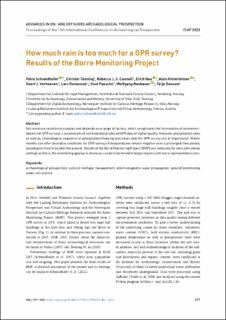| dc.contributor.author | Schneidhofer, Petra | |
| dc.contributor.author | Tonning, Christer | |
| dc.contributor.author | Cannell, Rebecca J S | |
| dc.contributor.author | Nau, Erich | |
| dc.contributor.author | Hinterleitner, Alois | |
| dc.contributor.author | Verhoeven, Geert J | |
| dc.contributor.author | Gustavsen, Lars | |
| dc.contributor.author | Paasche, Knut | |
| dc.contributor.author | Neubauer, Wolfgang | |
| dc.contributor.author | Gansum, Terje | |
| dc.date.accessioned | 2024-04-02T11:03:50Z | |
| dc.date.available | 2024-04-02T11:03:50Z | |
| dc.date.created | 2024-02-07T11:37:15Z | |
| dc.date.issued | 2023 | |
| dc.identifier.isbn | 978-3-928794-83-1 | |
| dc.identifier.uri | https://hdl.handle.net/11250/3124440 | |
| dc.description.abstract | Soil moisture variation is complex and depends on a range of factors, which complicates the formulation of recommendations for GPR surveys. Low amounts of soil moisture produced GPR data of higher quality. However, precipitation rates as well as chronological sequence of precipitation/thawing processes and the GPR survey are of importance. Winter months can offer favorable conditions for GPR surveys if temperatures remain negative over a prolonged time period, allowing for frost to build in the ground. Results of the Borre Monitoring Project (BMP) are valid only for sites with similar settings as Borre; the monitoring approach, however, can be transferred to larger regions with more representative sites. | en_US |
| dc.language.iso | eng | en_US |
| dc.relation.ispartof | Advances in On- and Offshore Archaeological Prospection: Proceedings of the 15th International Conference on Archaeological Prospection | |
| dc.title | How much rain is too much for a GPR survey? Results of the Borre Monitoring Project | en_US |
| dc.title.alternative | How much rain is too much for a GPR survey? Results of the Borre Monitoring Project | en_US |
| dc.type | Chapter | en_US |
| dc.description.version | publishedVersion | en_US |
| dc.source.pagenumber | 377-382 | en_US |
| dc.identifier.cristin | 2243996 | |
| cristin.ispublished | true | |
| cristin.fulltext | original | |
| cristin.qualitycode | 1 | |
